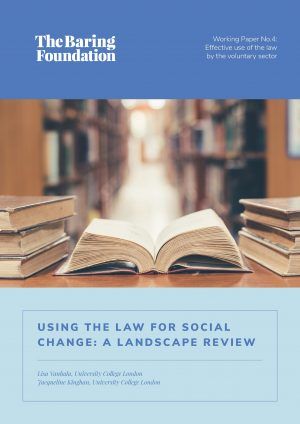This blog was written for the Institute for Voluntary Action Research (IVAR).
Law and human rights based approaches can be important tools for civil society. They can provide the means to tackle directly the discrimination and disadvantage faced by vulnerable people, and can also help safeguard the freedom of purpose, action and voice of the sector as a whole.
There are great examples of civil society organisations who have used these tools effectively. You may have seen the legal victory, RF v Secretary of State for Work and Pensions, in which a number of voluntary sector organisations were involved, that found the government’s changes to personal independence payments (PIPs) for people with mental health support needs to be discriminatory. Strategic litigation is one avenue, but using the law can be an effective tool in other ways too. (This 2016 publication provides a useful framework for understanding the different uses.)
The Baring Foundation’s Strengthening the Voluntary Sector programme has given 36 grants since 2016 to a wide range of organisations seeking to build their capacity in this area. However, it has become clear that the research underpinning questions such as how, when and under what conditions these approaches are effective, efficient and legitimate tools for the voluntary sector, is not well developed.
Earlier this year, the Baring Foundation appointed UCL academics Lisa Vanhala and Jacqui Kinghan and NPC as Learning Partners to this programme. Their review of the research landscape is the first step for the project in further developing our research agenda and outlines what is already known about how the UK voluntary sector is using these tools.
Here are some headline findings – the full (though fairly short!) review can be found here.
Types of law used
UK voluntary sector organisations tend to rely on human rights and equality law. There is much less research on use of the other types of law (such as labour law, administrative law, community care law) and other forms of law (such as collective/class actions, soft law, international treaties and other international legal mechanisms).
Constraints and opportunities in the UK legal system(s)
Different ways of using the law, and participating in litigation efforts specifically, come with their own advantages, disadvantages and costs in terms of ability to access the court, cost risks, and ability to share expertise with the court. Recent research highlights the need to better understand regional variation in the ability to access justice, obtain social welfare legal advice, effectively deploy human rights language and pursue public law remedies.
Resourcing legal action
Drastic cuts to legal aid in England and Wales have of course constrained voluntary sector organisations. New research on crowd-funding has noted that this is a potentially useful way of resourcing legal tactics, but this is not a totally straightforward process and has inherent risks both for voluntary sector organisations and for access to justice more broadly.
The impact of legal action on other relationships
Existing research has shown that cooperative relationships among VSOs can enhance the efficacy, legitimacy and effectiveness of using the law. It has also shown that competitive behaviour among voluntary sector organisations can undermine victories. A better understanding of the nuances of collaboration and partnership building in the UK will help identify both the possibilities and limitations of this approach across the sector.
Interaction between use of the law and other social change tactics
Almost all research on the use of the law points out that it will not be effective if used in isolation. A broader evidence base that identifies and measures outcomes and outlines which tools have been used, and to what effect, has the potential to meaningfully guide decision-making and resource allocation.
We’ll be following up some of these lines of enquiry in different ways over the next two and a half years and we hope that this review is also useful for the wider voluntary sector, legal and academic communities. You can keep up to date with the research agenda as it develops by signing up to the Foundation’s newsletter here.
